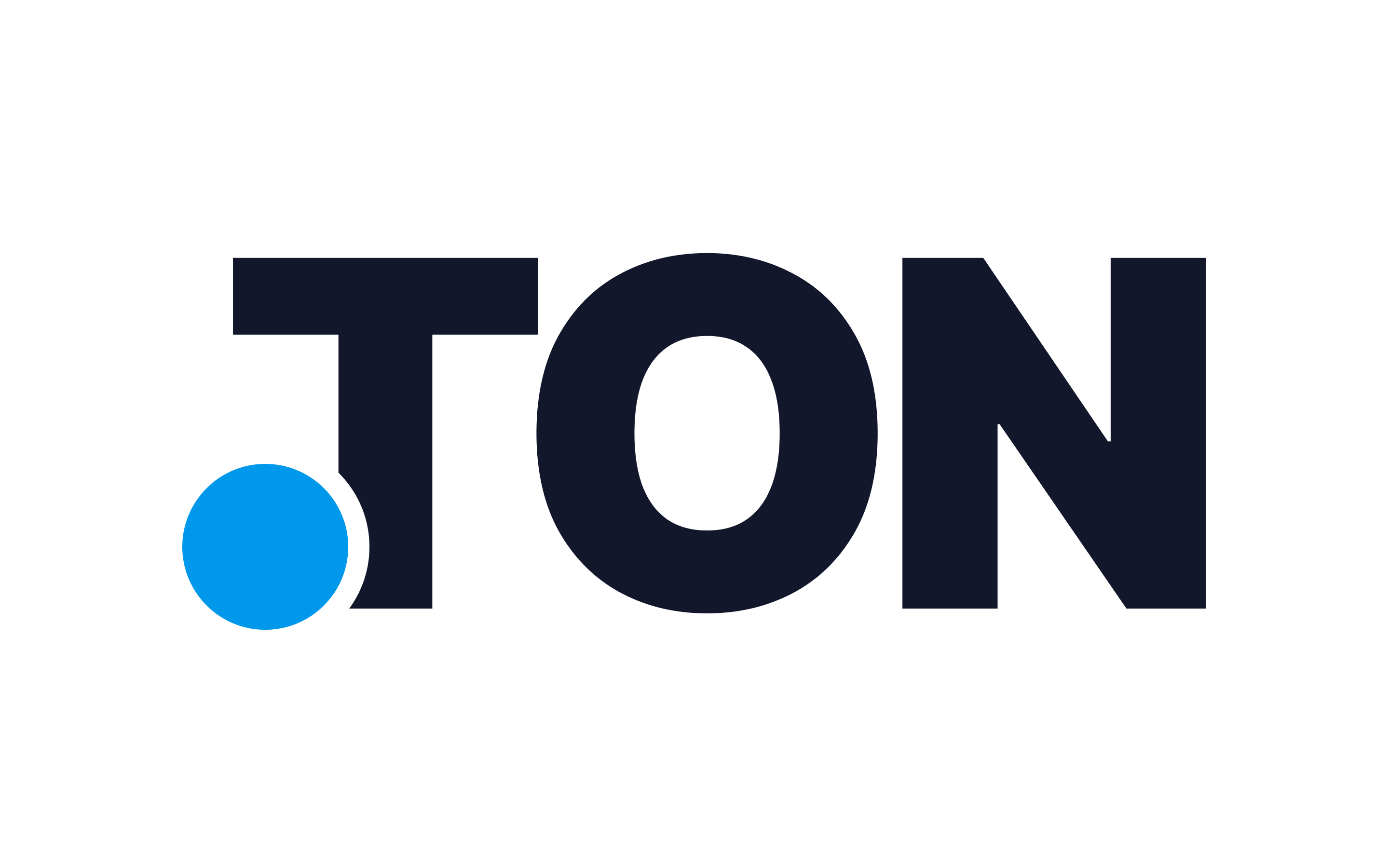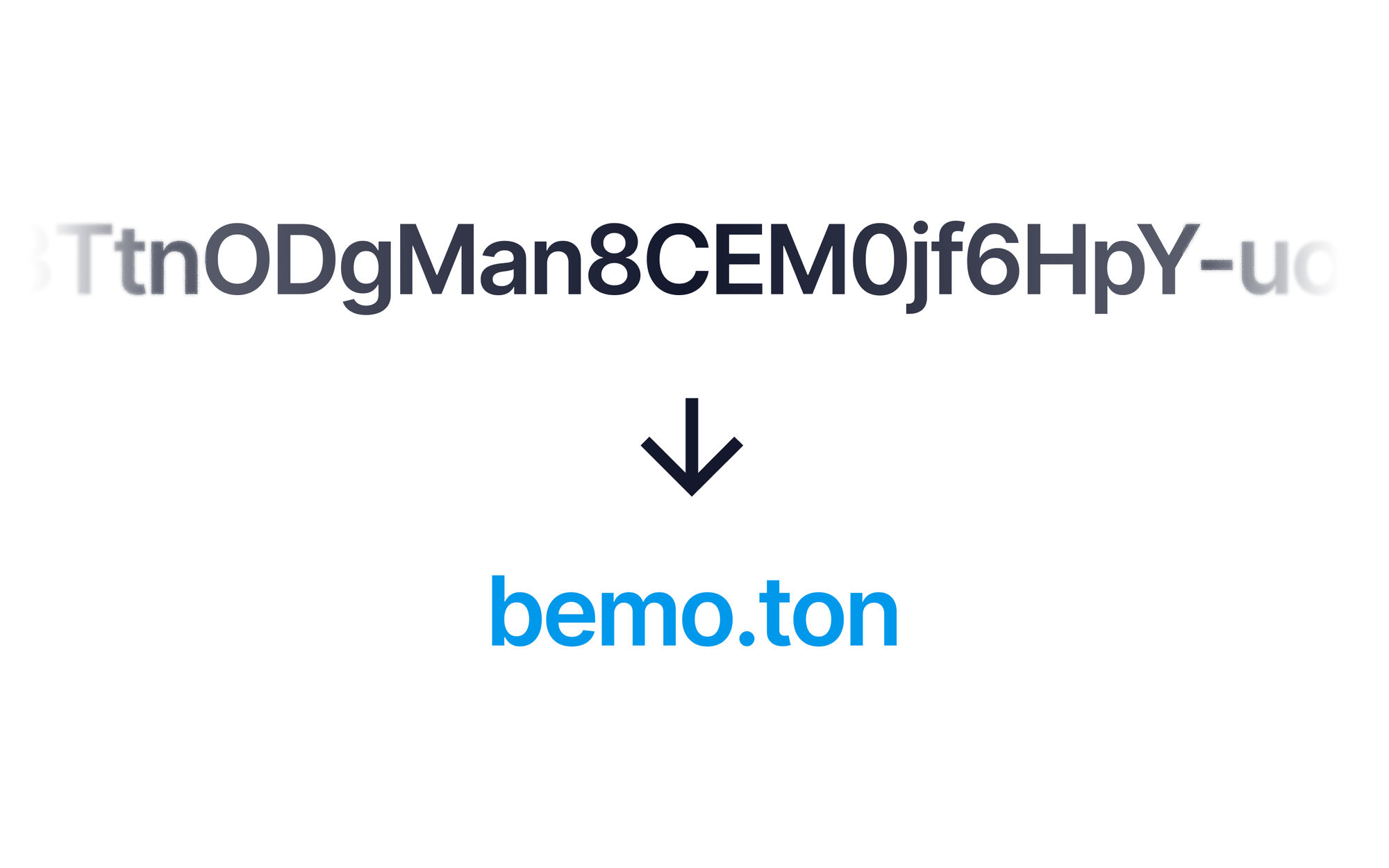Imagine sending cryptocurrency as easily as sending an email — no more confusing wallet addresses, just a simple, human-readable domain like alice.ton. That’s the kind of user-friendly future TON DNS is building within The Open Network (TON) ecosystem.
As the TON ecosystem grows and integrates more Web3 tools into everyday apps like Telegram, usability becomes essential. TON DNS — the decentralized domain name system — plays a pivotal role in making blockchain interaction feel as smooth as browsing the Web2 internet.
In this article, we’ll explore what TON DNS is, how it works, and why it’s essential for both developers and users. Plus, we’ll show you how Bemo leverages TON DNS to simplify staking with one memorable address: bemo.ton.
TL;DR – TON DNS at a Glance
- Assigns readable names like bemo.ton to wallets and smart contracts
- Fully decentralized and resistant to censorship
- Domains are minted as NFTs — tradable, ownable, and verifiable
- Domains can be used to host TON-native websites
- Distributed through fair, transparent auctions
- Extremely low renewal cost (~$0.10/year in TON)
- Developer tools available: TonWeb, TonLib, CLI
What is TON DNS?
TON DNS (The Open Network Domain Name System) is a decentralized naming service that allows users to assign human-readable names — like username.ton — to blockchain addresses, smart contracts, and services within the TON ecosystem.
Just like traditional DNS connects domain names like example.com to server IPs, TON DNS links readable domains to:
- TON wallet addresses
- ADNL addresses (used in TON infrastructure)
- Smart contracts
- Websites built on the TON network
It’s one of the core infrastructure components of TON, alongside:
- TON Blockchain (for transactions and smart contracts)
- TON Storage (for decentralized file storage)
- TON Proxy (for network routing)
- TON Sites (for Web3 websites)
By translating long cryptographic identifiers into intuitive names, TON DNS removes one of the biggest barriers to Web3 adoption: complexity.
Why TON DNS Matters
With over 1 billion users on Telegram, TON has massive reach — but most users won't interact with Web3 tools if they’re hard to understand. TON DNS helps bridge that gap by:
- Making blockchain services feel familiar
- Eliminating the need to copy long wallet addresses
- Supporting seamless interaction in Telegram’s in-app browser
Mass adoption isn’t about more features — it’s about making those features easy and intuitive.
How TON DNS Works
Domain Name Structure
TON DNS domains:
- Use UTF-8 strings up to 126 bytes
- Are case-sensitive (but can be normalized to lowercase)
- Currently support domains ending in .ton (e.g., bemo.ton, wallet.ton)
More top-level domains (TLDs) like .wallet and .surf may emerge over time, but .ton is the primary one used today.
Domain Hierarchy
TON DNS mirrors the structure of traditional DNS:
- Top-level domains like .ton are managed by the TON Foundation
- Users can register second-level domains like bemo.ton
- Further subdomains like blog.bemo.ton are also supported

Record Types
TON DNS currently supports several record types:
- site — for TON-hosted websites
- wallet — links to a TON wallet address
- other — custom entries stored as key-value pairs for flexible integrations
Key Features of TON DNS
Human-Readable Wallet Addresses
Instead of using a cryptic string like UQDYzZmfsrGzhObKJUw4gzdeIxEai3jAFbiGKGwxvxHinf4K, you can simply send TON to pavel.ton or mom.ton.
TON DNS is supported by leading ecosystem apps, including:
- Tonkeeper
- Tonscan
- CryptoBot
- TON Wallet
NFT-Based Ownership
TON DNS domains are minted as NFTs, making them:
- Ownable
- Transferable
- Tradable on marketplaces
This gives users true control over their domain assets.
TON-Based Websites
You can host decentralized websites on TON using your domain:
- Open bemo.ton in Telegram’s built-in browser
- Or access it via a regular browser by adding .sc or .run (e.g., foundation.ton.sc)
Transparent Auctions
Domains are distributed through an open auction system at dns.ton.org:
- Search for your desired domain
- Place a bid using Toncoin
- Wait about one hour for the auction to complete
- If you win, the domain appears in your wallet as an NFT
Minimal Annual Cost
TON DNS domains require only a symbolic renewal fee — around $0.10 per year, paid in Toncoin — to confirm ownership.
Advantages of TON DNS over Traditional DNS
This side-by-side comparison highlights the structural advantages TON DNS offers as a modern naming system for Web3.
Practical Applications of TON DNS
Simplifying Blockchain Interaction
TON DNS improves the user experience by replacing cryptographic wallet addresses with names people can remember. For example:
Instead of: Send your TON to UQDYzZmfsrGzhObKJUw4gzdeIxEai3jAFbiGKGwxvxHinf4K You can say: Send your TON to nikolai.ton
This is exactly the kind of simplicity required to bring new users into Web3.
Easier Than .onion Sites
Compared to .onion addresses used on the TOR network, TON domains offer a much better user experience:
- No need to install special software — just use Telegram
- Faster load times
- Readable, memorable domain names instead of long strings of random characters
Developer Tools and Integration
TON DNS is developer-friendly, with multiple tools for integration:
- TonWeb — JavaScript SDK for Web3 applications
- TonLib — Core library for TON protocol integration
- Command-line tools — including tonlib-cli and Lite-client, both of which support DNS queries
These tools allow developers to build apps, wallets, and services that take full advantage of TON DNS.
Why TON DNS Matters to the TON Ecosystem
Core Infrastructure Component
TON DNS is a foundational part of TON’s broader vision — working alongside TON Blockchain, TON Storage, and TON Proxy to enable a fully decentralized internet. It provides an essential naming layer that connects users, smart contracts, and services in a seamless way.
Simplified Addressing Across the Network
TON supports several types of addresses — from raw cryptographic formats to user-friendly strings. TON DNS introduces a third type: human-readable names like pavel.ton or pavel@crypto, making transactions easier to follow, share, and analyze.
Fueling dApp Development
By eliminating unnecessary complexity, TON DNS makes it easier for developers to build intuitive decentralized apps. A good naming system means better user interfaces, faster onboarding, and more cohesive integrations between services.
It’s a key enabler of TON’s mission: making decentralized technologies usable for everyone — even complete beginners.
Bemo.ton: A Real Example of TON DNS in Action
At Bemo, we registered our own TON DNS domain — bemo.ton.
This address links directly to the smart contract managing $bmTON, our liquid staking token. Here’s what users can do with it:
- Track on-chain data: Use Tonscan or Tonviewer to view transactions, current holders, and total supply
- Stake in one step: Just send TON to bemo.ton and receive bmTON in return
Important: Don’t include comments or extra data in the transaction. The contract processes only clean transfers. If comments are included, your TON will be returned automatically.
With bemo.ton, staking becomes as simple and secure as sending a message.

Conclusion
TON DNS plays a vital role in making blockchain technology more accessible, intuitive, and censorship-resistant. It transforms complex wallet addresses into readable, tradable domain names — removing a major barrier to entry for everyday users.
Its decentralized nature, low cost, and auction-based distribution model make it an ideal foundation for the next generation of Web3 tools.
As decentralized websites and services continue to grow within the TON ecosystem, TON DNS will remain a critical enabler — helping TON realize its vision of a more open, usable, and truly decentralized internet.









